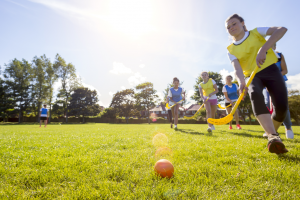
Concerns over childhood obesity are never far from the headlines. Pupils today experience increasing stress in school from a number of sources – with exams being just one factor.
As governors, what part do we play in this? While there isn’t just one simple solution, the School Sport and Activity Action Plan offers one view, and it’s important to consider what this means for school governors.
The UK Chief Medical Officers’ Physical Activity Guidelines recommend that children and young people should engage in 60 minutes of physical activity every day. Yet Sport England’s Active Lives survey shows a third of children are doing less than 30 minutes of physical activity every day – and only 46.8% of children and young people are actually doing the recommended amount.
In July 2019, the Department for Education, alongside the Department for Digital, Culture, Media & Sport and the Department of Health & Social Care, published the School Sport and Activity Action Plan.
This document sets out a statement of intent from these departments to make sure sport and physical activity become ‘an integral part of both the school day and after-school activities, so that all children have the opportunity to take part in at least 60 minutes of physical activity every day’.
The School Sport and Activity Action Plan makes clear the importance the DfE are placing on sport to help young people develop resilience and determination and learn values such as friendship and fairness. It also believes sport will encourage children to interact with their peers more and tackle social isolation.
Potential benefits for improved physical literacy go far beyond a healthy body. It’s also important for better mental health. The Active Lives survey shows that children who are more active are happier than their less active counterparts. Similarly, those children who were active every day presented as more resilient and determined in the face of a challenge than those children who were active less frequently than this.
The School Sport and Activity Action Plan reminds us that the new Ofsted Inspection Framework, which came into effect in September 2019, gives increased recognition to the work schools are doing to support pupils in developing their character. This translates into increasing resilience, independence and confidence while learning how to keep mentally and physically healthy.
The document also sets out a number of actions and commitments. Immediate actions to support schools include:
- £2m from the DfE to improve coordination of P.E training and to help schools open up facilities
- Reviewing teacher training to ensure PE teachers are equipped to deliver high quality lessons
- Updating national PE and Sport Premium guidance for schools and providing a toolkit to help schools use this funding more effectively
- Providing up to £6m to support schools to deliver the new health and relationships curriculum
- More action taken to ensure all primary leavers have swimming and water safety skills
- A new scheme for schools to rate their health and wellbeing provision
How can governors support sport and wellbeing in their school?
So there’s plenty of evidence to suggest children need to be more active – and we know they’ll have a better quality of life for doing so. You’re likely to hear more about this, through discussions at governors meetings, during school visits and through regular reporting sessions over the coming year – but in the meantime, what can you do and ask that will help the children in your school?
A good starting point may be finding out what the school knows about this action plan already. It was introduced in July – typically a challenging time for schools – and so might still be a fairly new document for the relevant staff. A conversation with the PE lead might also help you understand the role of sport, health and wellbeing in the school strategy.
The topics of physical literacy, mental health and wellbeing will become far more common place for governors than ever before. And rightly so – we all want to see happy, healthy children who are well equipped for life in our schools.
We think this is a topic that deserves far more reflection and discussion.